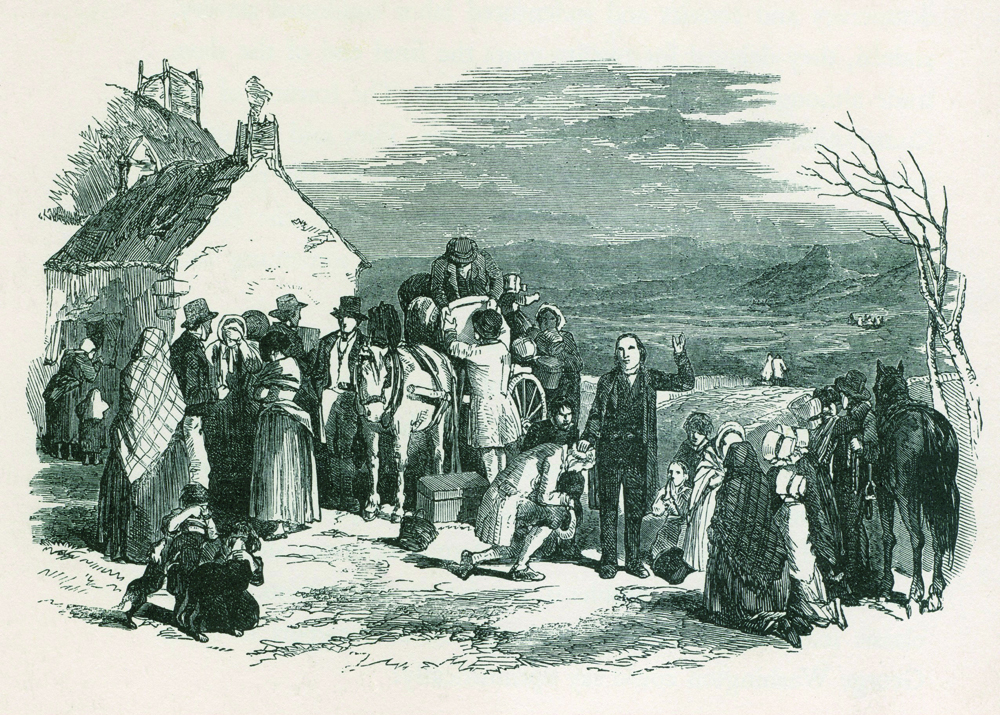 Menu
Menu
 Menu
Menu
Have the rich always been eating the poor?
The Ireland of Jonathan Swift’s time was filled with oppression. The poor Catholic majority was oppressed by Ireland’s Anglo-Irish ruling class. And the Anglo-Irish were oppressed by their English rulers in London.
Oppressive power frustrated both Irish Catholics and the Anglo-Irish. But frustration with oppression was not unique to Swift’s Ireland. History and current events are filled with people who are fed up with power and authority. Sometimes, that frustration is widespread. Today seems to be one of those times.
Why are so many people frustrated today? By almost every measure, society has been on a path of improvement since Jonathan Swift’s time. Most western nations still have serious poverty and homelessness issues, but they are nothing like the poverty and famines that ravaged pre-20th-century Ireland.

A Catholic priest blesses kneeling immigrants as they leave their homes and families in Ireland for North America during the potato famine, c.1850.
Despite society’s long-term trajectory of advancement, there appears to be a growing sense today that our rulers simply rule for themselves. In fact, one widely-cited American study has shown that the lower classes only get the laws and policies they want if their demands coincide with upper-class desires. In other words, most laws created today—at least in
the United States—are the laws that the rich and powerful want.
Whether or not this study’s findings are entirely true, thinkers such
as former American Secretary of Labor Robert Reich have pointed out
that over the past 40 years, many changes to the law appear to primarily
benefit the upper classes. Taxes have decreased for corporations and
the wealthy, labour laws have been weakened, and social programs have
been cut.
These changes have coincided with—and may very well have contributed to—a sharp rise in economic inequality. Following World War II, everyone shared in economic growth. However, starting in the 1970s the richest few began taking a disproportionate share of the growth.
For example, in 1965 the 350 top American CEOs earned about twenty times more than the average worker. By 2018, the top CEOs were earning 287 times more. Because the rich earn more, they also save more. Globally, half of the world’s wealth is now owned by the richest 1% of people, an imbalance not seen since the 1930s.
Canada’s richest 87 families have as much wealth as everyone in Newfoundland, Prince Edward Island and New Brunswick combined.
Economic inequality in Canada has followed suit. By 2016, Canada’s top 100 CEOs were earning 209 times more than the average worker. In fact, Canada’s richest 87 families have as much wealth as everyone in Newfoundland, Prince Edward Island and New Brunswick combined.
Whatever the causes of economic inequality may be, when societies become more economically unequal, everyone’s well-being worsens. Literacy, life opportunities, and life expectancy go down, access to justice is reduced, and crime and drug abuse go up. Perhaps even more disturbingly, extreme disparity can lead to a breakdown of society and democracy.
Warnings that economic inequality could break down society have come from the highest levels. For example, Janet Yellen—the former chair of America’s central bank—said that growing inequality “can shape [and] determine the ability of different groups to participate equally in a democracy and have grave effects on social stability over time.” Put more simply, democracy is undermined as wealth disparity grows.
Democracy is undermined as wealth disparity grows.
Such claims give reason for pause. That said, one must be careful not to directly transpose America’s experience to Canada. This is especially true given that the USA generally has looser political financing laws, greater income inequality, and a weaker social welfare state.
Nevertheless, the broader point should not be missed: Everyone’s voice should count equally in a democracy. But economic inequality can result in a ruling class that actively serves its own interests and oppresses lower classes. Just like in Jonathan Swift’s Ireland, today’s lower classes are at risk of being ignored or actively oppressed by upper classes with too much power.
In 1994, an economic boom hit Ireland. During the boom, banking regulations were loosened and tax laws were changed to favour the rich. Looser regulations and lower taxes were sustainable until the economy collapsed in 2007.
With the collapse, average people lost their jobs and homes. The Irish government did little to help. In fact, taxes were raised, social programs were cut, and the minimum wage was reduced. However, when the collapse pushed Irish banks towards ruin, the government rushed in a €64 billion bailout.
The bailout led to even more tax increases and program cuts for average citizens. As well, it created a huge public debt. As Irish historian Thomas Bartlett put it, “the billions deployed to bail out the delinquent banks in the first decade of the twenty-first century would be a charge on the future, unborn generations: the Republic had eaten its young.” Swift’s idea of the rich eating poor children metaphorically returned to Ireland.
Economist Paul Krugman agreed. He pointed out that the Irish government could not find money for average citizens, yet found billions to backfill the losses of “private wheeler-dealers seeking nothing but their own profit.” Krugman concluded that “only a satirist—and one with a very savage pen—could do justice to what’s happening to Ireland now.”